Key takeaways:
- Theater ignites a passion for vulnerability and connection, allowing for deep emotional expression and self-discovery through various characters.
- Overcoming self-doubt involves mindset shifts, thorough preparation, and embracing mistakes, which ultimately fosters confidence on stage.
- Feedback and growth are essential in refining performance skills, encouraging exploration of new roles, and reinforcing the transformative nature of challenges.
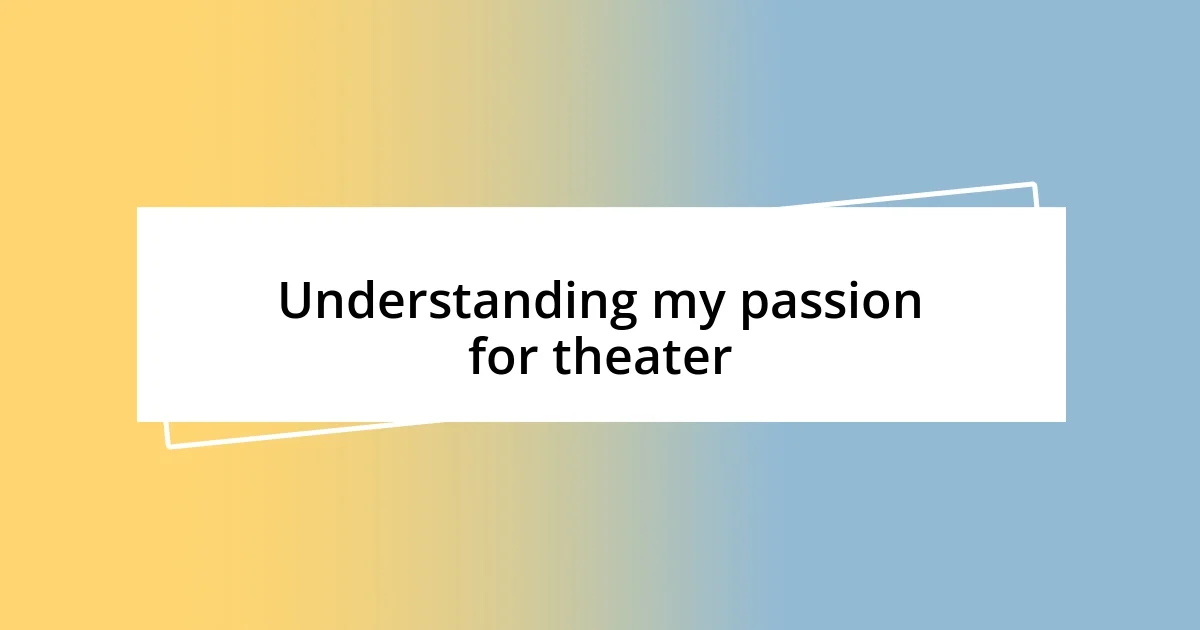
Understanding my passion for theater
The moment I stepped onto a stage for the first time, I felt electricity coursing through me. There was something exhilarating about being in front of an audience, transforming into a different character, and expressing feelings that often stayed hidden in my everyday life. Have you ever experienced that rush where you forget your worries and become fully immersed in another world?
I remember the late nights spent rehearsing lines until my voice felt raw, yet there was a certain comfort in the chaos. Those moments taught me that theater is more than just acting; it’s about vulnerability and connection. I found that sharing stories and emotions through performance can resonate deeply with others, making the experience profoundly fulfilling. How powerful is it to know that your passion can touch someone’s heart?
As I navigated through different roles, I began to unearth layers of my own personality. Each character offered a new perspective, challenging me to confront my fears and insecurities. It made me wonder, how often do we let our true selves shine when we’re not on stage? Through this exploration, I discovered that the passion for theater isn’t just an interest—it’s an essential part of my identity, urging me to seek authenticity in every aspect of my life.
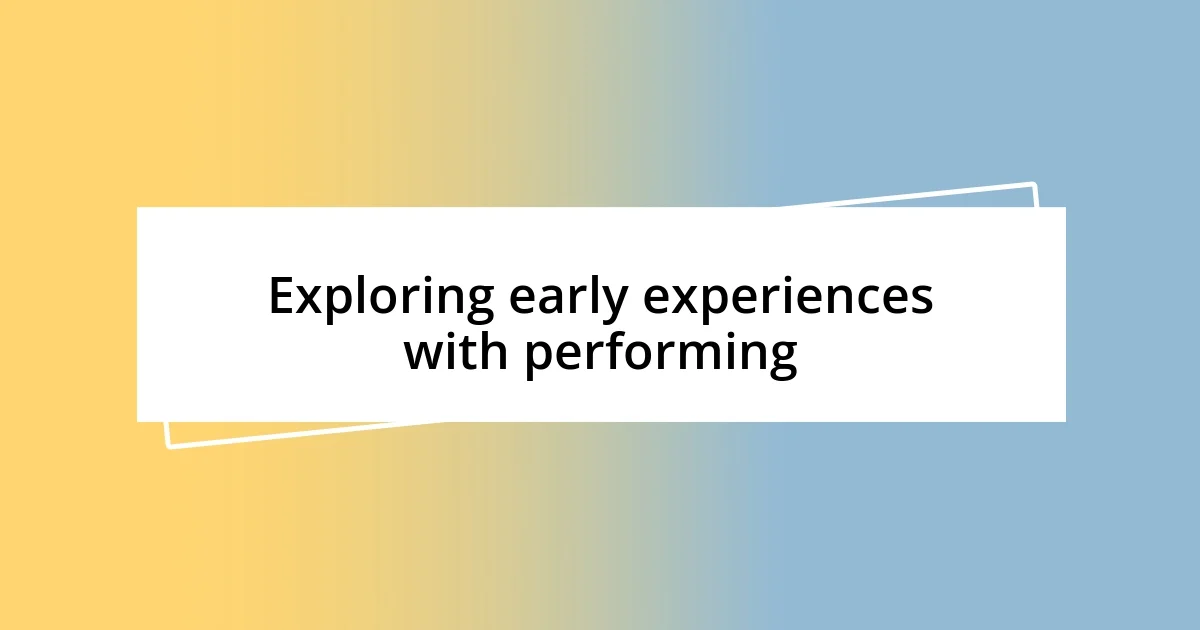
Exploring early experiences with performing
The first time I performed in front of an audience, I remember my heart racing and my palms sweating, yet I felt so alive. It was a small school production, and I played a supporting role that seemed minor at the time. However, when the spotlight hit me, something clicked. I wasn’t just delivering lines; I was sharing a piece of myself with the audience. Have you ever felt that strange mix of fear and excitement?
Looking back, those initial performances felt like stepping stones on a long and winding path. Each show brought new challenges, whether it was memorizing an intricate monologue or learning to navigate stage fright. I recall a moment when I forgot my lines, and while panic set in briefly, I embraced the audience’s laughter. It taught me that theater is a living, breathing entity—imperfect yet beautiful. Have you ever turned a potential disaster into a moment of connection?
As I delved deeper into various characters, I discovered early on how transformative it felt to assume different identities. Just like peeling an onion, I would often find layers of emotions and thoughts previously hidden. This exploration revealed aspects of myself that I didn’t realize existed. It made me wonder, how can we fully embrace each role, both on stage and in our lives? These early experiences were not just about the performances; they shaped my understanding of authenticity and self-expression in ways I never anticipated.
| Experience | Emotional Insight |
|---|---|
| First performance | Exhilaration and fear |
| Memorizing lines | Challenge and connection |
| Assuming different characters | Self-discovery |
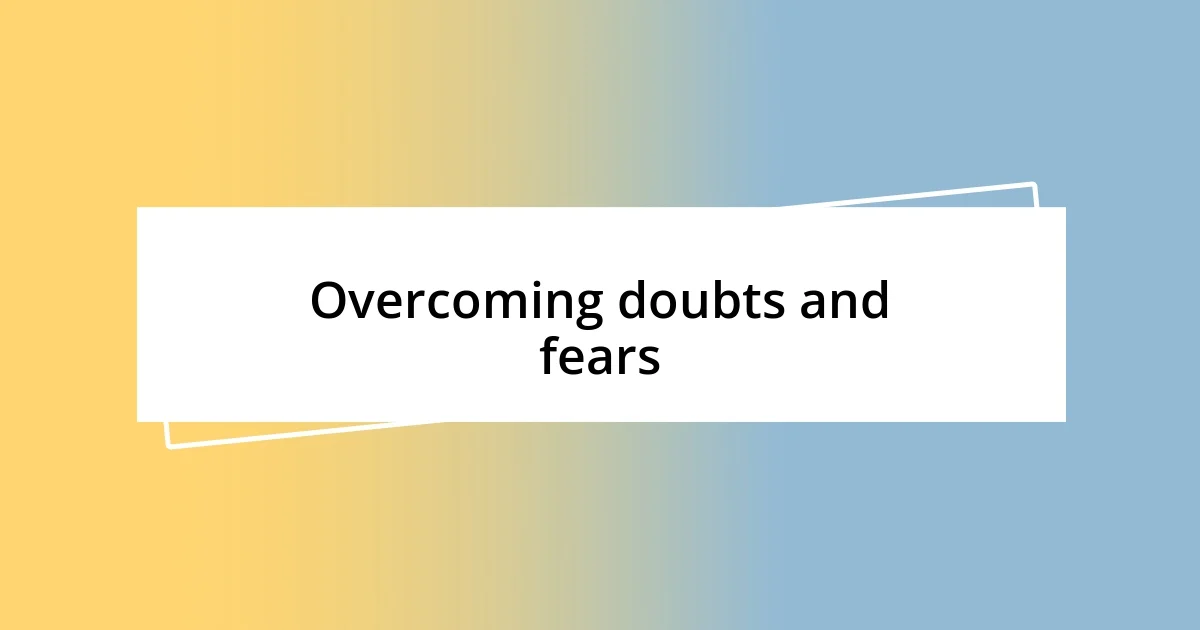
Overcoming doubts and fears
There was a moment during my journey in theater when self-doubt crept in, whispering that I didn’t belong on stage. It hit me particularly hard before a big audition. I was struck by the thought: what if I wasn’t good enough? Yet, I pushed through and reminded myself of moments where I truly connected with the audience. I learned that the fear of failure is often outweighed by the joy of self-expression. In essence, embracing those vulnerabilities became my strength.
To navigate through doubts and fears, I focused on a few key practices:
- Mindset shifts: I learned to replace negative thoughts with affirmations, reminding myself of my unique contributions.
- Preparation: By thoroughly preparing for each performance, I built confidence in my abilities.
- Sharing experiences: Talking with fellow performers helped me realize that I wasn’t alone in feeling intimidated.
- Embracing mistakes: I began to see errors as opportunities for growth, turning potential setbacks into learning experiences.
- Visualizing success: I often closed my eyes and imagined the applause and positive reactions, which helped me cultivate a sense of reassurance.
These steps became essential tools, guiding me through the fog of self-doubt and allowing me to find my voice with greater clarity and confidence in the theater world.
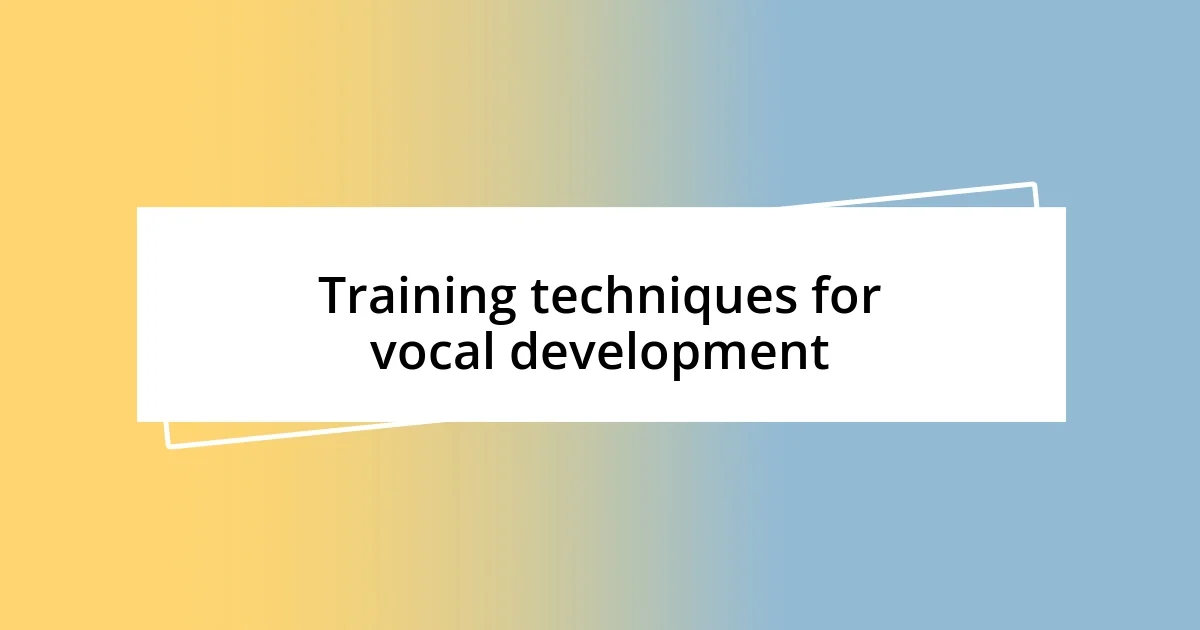
Training techniques for vocal development
Training techniques for vocal development are essential in honing the skills needed for powerful performances. One of my favorite techniques is warm-up exercises. I remember one particular session where my instructor introduced me to the “lip trill” exercise. As I stumbled through the first attempts, focusing on breath support, I felt my confidence grow with each sound. It reminded me that developing my voice was just as much about playing as it was about practice.
Another technique that proved invaluable was practicing scripted readings. I recall sitting in my living room, reciting different scenes from my favorite plays, experimenting with tone and pitch. This exercise not only sharpened my articulation but allowed me to explore the emotional depth of each character. It made me wonder—how can we truly express emotion without fully embracing our vocal variations? There’s something liberating about pushing those vocal boundaries.
Lastly, feedback is a game-changer. Once, during a group workshop, my peers pointed out certain habits I wasn’t aware of that affected my vocal delivery. It was a bit daunting at first, but their insights equipped me with practical tools to refine my technique. Have you ever experienced that “aha moment” when someone else’s perspective opened your eyes? The combination of personal practice and external feedback creates a rich tapestry for vocal growth, making it an ongoing journey of discovery.
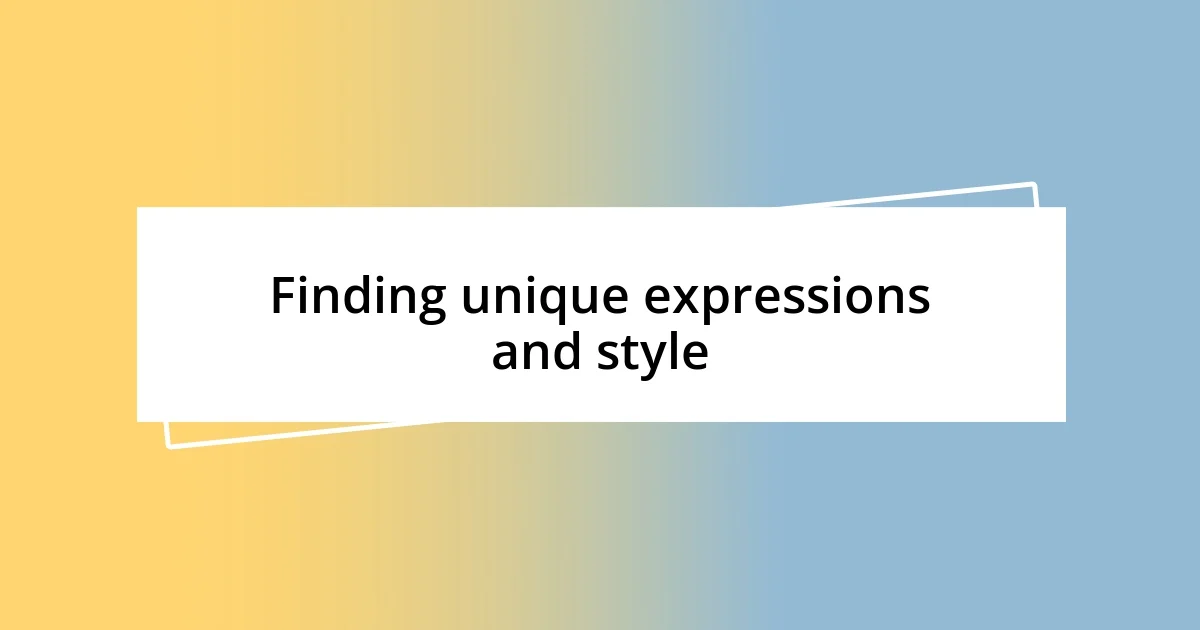
Finding unique expressions and style
Finding my unique expression and style in theater was a deeply personal journey. I remember the thrill of experimenting with different characters and discovering aspects of myself I had never tapped into before. One night, while rehearsing a particularly intense scene, I let my emotions flow unchecked, tapping into an inner vulnerability that surprised even me. It was a revelation—I realized that authenticity was key to creating a compelling performance.
One thing I learned is that uniqueness comes from embracing flaws and quirks. I vividly recall a performance where my character’s nervous tics became a point of connection with the audience. What started as an attempt to portray anxiety morphed into something relatable, drawing laughter and understanding from those watching. It made me ponder—how much of our true selves can we unveil on stage without fear? I found that the more I leaned into my idiosyncrasies, the more distinctive my performances became.
Moreover, I began to develop my style by incorporating elements I loved from various influences. One evening, inspired by a classic musical, I started blending genres in my work. That mixing of styles opened up creative avenues I hadn’t considered before. Have you ever felt the exhilaration of intertwining inspiration from different sources? I believe those moments of fusion are where the magic truly happens—a beautiful tapestry of experiences that shape our voice in the theater.
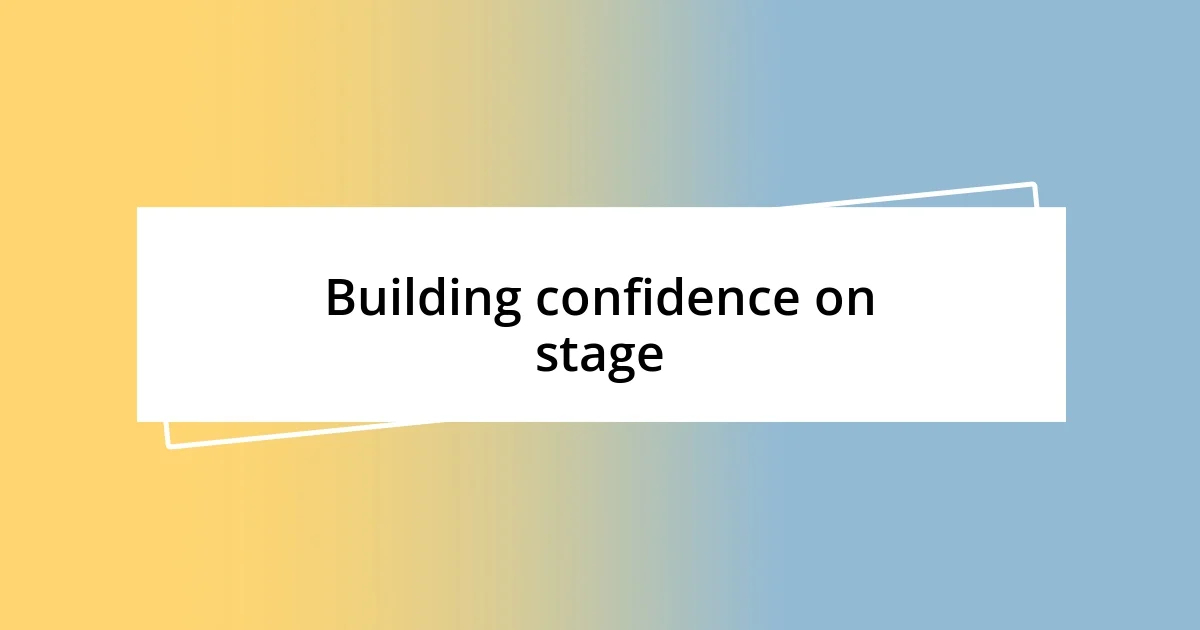
Building confidence on stage
Building confidence on stage often feels like an uphill battle, but I realized that the key to overcoming the jitters lies in preparation. One memorable performance had me pacing backstage, my heart racing as I faced the audience. As I focused on my breathing and reminded myself of my rehearsal moments, I felt this shift within—a quiet determination emerged, replacing fear with excitement. Have you ever felt that electrifying moment when you realize you’re ready?
Engaging with my fellow actors also played a pivotal role in boosting my confidence. During one rehearsal, a seasoned performer encouraged me to step out of my comfort zone and take on a more challenging role. Initially, I hesitated, gripped by self-doubt, but their faith in me was infectious. I embraced the challenge, and as I delivered lines with newfound passion, I discovered confidence wasn’t just about overcoming fear; it was about trusting others while learning to trust myself. When has someone’s belief in you changed your perspective?
Repetition is another tool that I found incredibly valuable. Practicing scenes over and over again, until they felt like second nature, made a world of difference. There was one instance when I performed a particularly complicated monologue, and after countless hours of rehearsal, I finally delivered it effortlessly. The audience’s applause felt like a warm embrace, affirming that hard work truly pays off. Isn’t it affirming when you realize that your dedication translates into genuine connection with the audience? Each performance became a building block of my confidence, laying a foundation for the next.
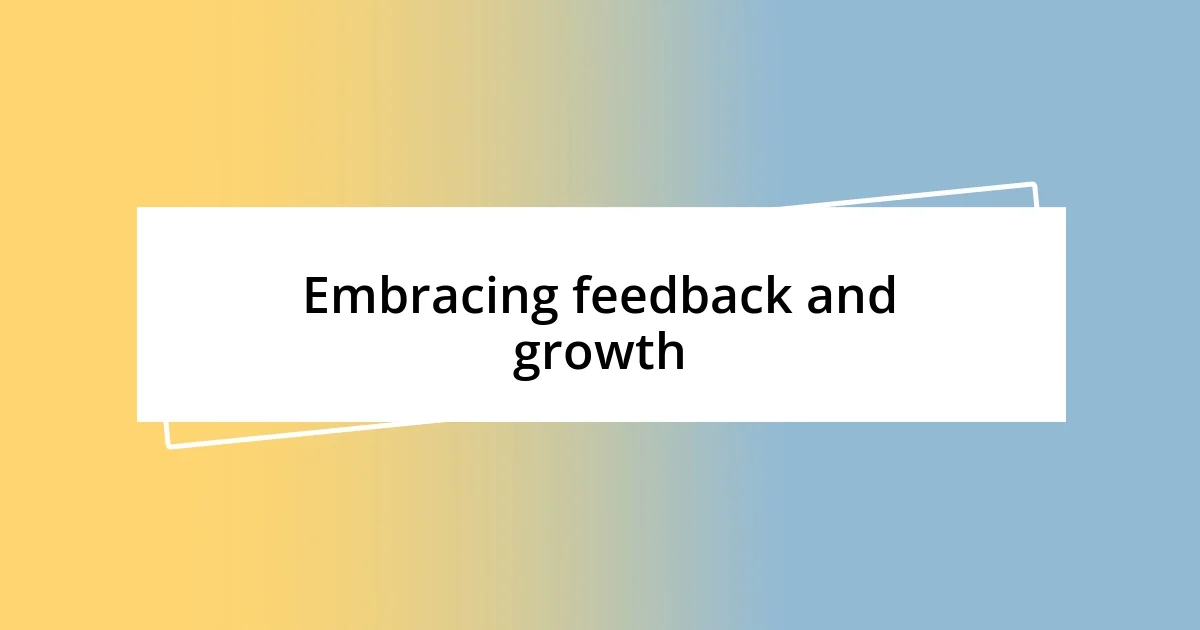
Embracing feedback and growth
Embracing feedback has been a crucial part of my journey in theater. During one rehearsal, a director pointed out a small nuance in my performance that I had completely overlooked. At first, I felt defensive, but after a moment of reflection, I recognized this insight was a gift—it offered a new layer to explore in my character. Have you ever had someone’s observation change how you see your own work? I found that being open to constructive criticism not only helps me grow but also deepens my understanding of the craft.
Growth is often an uncomfortable process, but I’ve learned to lean into that discomfort. There was a time when I was absolutely terrified to take on a more demanding role. A close friend reminded me that every performance was just another step in the evolution of my voice. This thought struck me like a revelation; embracing new challenges helped me discover capabilities I never knew existed. Isn’t it amazing how stepping out of our comfort zones can lead to unexpected breakthroughs?
After a particularly challenging production, I took a moment to reflect on the lessons learned from both successes and missteps. I realized that each piece of feedback and every moment of doubt contributed to my growth, shaping my unique voice. That time my lines fell flat taught me about the necessity of pacing, while the praise I received for a passionate delivery reminded me of the importance of emotional connection. Isn’t it powerful to think that challenges can become our greatest teachers? Embracing feedback, with all its ups and downs, has truly been a transformative element of my theater journey.














